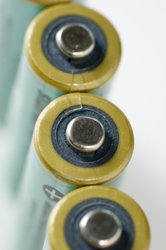Safer rechargeable lithium-ion batteries
Unlike a desktop PC that gets power through a cable connected to an electricity outlet, portable electronics devices require portable power supplies. Portable or mobile power is provided through a battery, a device that stores and releases energy on demand. One of the most popular batteries around is the lithium-ion (Li-ion) rechargeable battery. Li-ion batteries offer excellent reliability, compact size, light weight, high capacity and fast charge/discharge cycles making them superior to most other rechargeable batteries on the market. Aside from their widespread popularity in hand-held electronics, they are gaining important market share in high-power devices such as power tools and those in defence, aerospace, medical and electric vehicle applications. European researchers set out to develop better and safer rechargeable Li-ion batteries for integration into renewable energy sources, such as solar cells, with EU funding of the ‘Ionic liquid lithium based batteries’ (Illibatt) project. Conventional Li-ion batteries consist of two electrodes, the anode and the cathode, and an electrolyte (charge-carrying solution) of Li+ ions in an organic (non-aqueous) solvent. Illibatt’s novelty was in developing solid-state components, particularly the electrolyte solution, based on novel ionic liquids and composites formed from them. Ionic liquid-based gel electrolytes in the final prototype battery cell would yield all-solid-state cells with enhanced safety and minimal environmental impact. The team also studied the entire battery system in order to develop novel nano-structured anodes again based on novel ionic liquids. Overall, Illibatt investigated development of all-solid-state rechargeable Li-ion batteries with extremely high energy-to-weight ratio and energy efficiency using non-volatile and thermally stable ionic liquids. Commercialisation of concepts could make green solar energy even greener.







